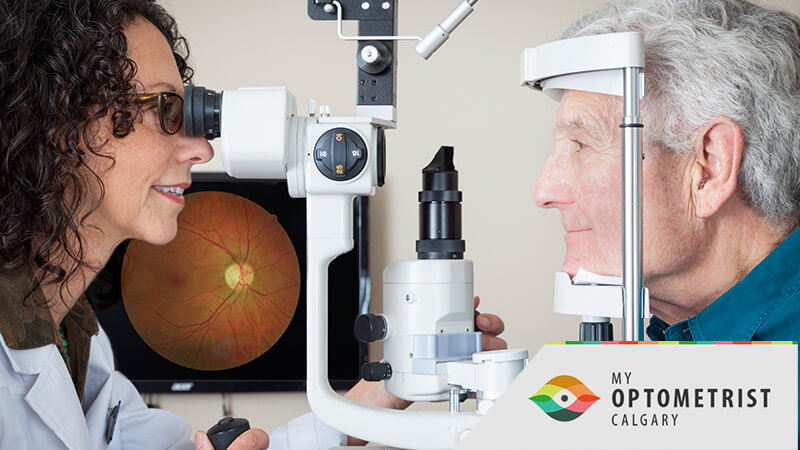
Your eye doctor will typically be the first to detect the signs and symptoms of age-related macular degeneration, also known as AMD, during your routine eye exam. When this happens, and the disease is found long before you notice any changes to your vision,your optometrist has the opportunity to help intercept and treat AMD before any serious changes or deterioration occurs.
If you are wondering how macular degeneration is detected and diagnosed, this post will cover the types of eye exams most typically used by eyecare professionals to catch this disease in its earliest stages.
Macular degeneration is an age-related vision impairment that causes you to lose clear vision in the central part of your eye. As the name implies, this is an age related eye disease that most commonly affects those aged 50 and older, but can affect people of any age. The best way to detect and diagnose AMD before symptoms appear is through a routine eye examination.
Macular degeneration may be detected a number of ways:
- Your optometrist may notice changes in the macula (center of the retina)
- You may notice changes to your such as blurred vision, dark areas in your line of sight, or difficulty reading
- You notice loss of your central vision (AMD very rarely causes full vision loss)
When these signs and symptoms are present, your Optometrist will conduct further testing to reach a confirmed diagnosis of AMD.
A dilated eye exam uses drops to force the pupil to stay open so the optometrist can examine the back of the retina. This can detect signs of macular degeneration through the appearance of drusen (deposits of cell waste under the retina) and by pigment changes in the macula.
An Amsler Grid tests whether straight lines look wavy or distorted, or if areas of the visual field are missing. This is used to detect the visual impairments that are often related to AMD.
OCT, or Optical Coherence Tomography uses infrared light waves to take cross-section photographs of the retina and choroid layer to detect new blood vessels and hemorrhaging, drusen, and changes in the retinal structure that may indicate AMD.
Optical Coherence Tomography Angiography, or OCTA for short, is another type of test that simultaneously takes a 3D image and assesses the blood flow within the retina and the choroid.
Fluorescein Angiography uses a special dye called fluorescein to get detailed images of the blood vessels within the eye to detect leaking into the macula.
Calgary and Three Hills Eye Care Specialists
Although there is no cure for macular degeneration, having your eye doctor screen for it and detect it early on, will give you the best chance of slowing its progression. With a program of supplementation, corrective vision tools, and other treatment options your vision can be preserved for much longer than without any intervention.
My Optometrist Calgary is a leading Macular Degeneration Screening Clinic offering top of the line eye examinations and treatment options. With locations in NE Calgary, SW Calgary ,and Three Hills, Alberta, you can always find an experienced and knowledgeable eye doctor to help you with any and all of your vision concerns. Fill out the contact form below or call the location that is nearest to you.
FAQs
Q: What are the initial symptoms of Age-Related Macular Degeneration?
A: Macular Degeneration (AMD) is an eye disease that causes blurred or vision loss to the central part of your vision. Often, the peripheral vision will remain intact, but you will begin to notice a difficulty distinguishing small details and colours within the centre of your view. Other early stage signs of AMD are difficulty reading, driving, and even recognizing faces.
Q: What causes Macular Degeneration?
A: There is no exact cause for AMD, but there are certain factors, lifestyles, and behaviours that will increase your risk of contracting the eye disease such as:
- Being over the age of 50
- Having family members with the condition
- Being caucasion
- Smoking
- Obesity
- Improper nutrition
- Cardiovascular disease
Q: How can I decrease the likelihood of developing AMD?
A: As there are factors that increase the risk of developing Macular Degeneration, there are also lifestyle choices that will decrease your chances of getting the eye disease. They are:
- Regular eye examinations by an Optometrist
- Quitting/avoiding smoking
- Daily physical activity to maintain a healthy weight and decrease overall health risks
- Managing existing health conditions
- Eating a variety of fresh fruits, vegetables, and leafy greens
- Proper supplementation as recommended by your eye doctor